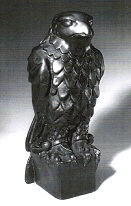History and use
The use of the MacGuffin plot technique predates MacGuffin as the name of the technique. The Holy Grail of Arthurian legend has been cited as an early example of a MacGuffin. The Holy Grail is the desired object that is essential to initiate and advance the plot, but the final disposition of the Grail is never revealed, suggesting that the object is not of significance in itself. [8] An even earlier example would be the Golden Fleece of Greek mythology, in the quest of Jason and the Argonauts; "the Fleece itself, the raison d'être of this entire epic geste, remains a complete [...] mystery. The full reason for its Grail-like desirability [...] is never explained." [9] [10]

The World War I–era actress Pearl White used the term "weenie" to identify whatever object (a roll of film, a rare coin, expensive diamonds, etc.) impelled the heroes and villains to pursue each other through the convoluted plots of The Perils of Pauline and the other silent film serials in which she starred. [11] In the 1930 detective novel The Maltese Falcon , a small statuette provides both the book's title and its motive for intrigue.
The name MacGuffin was coined by the English screenwriter Angus MacPhail. [12] It has been posited that "'guff', as a word for anything trivial or worthless, may lie at the root". [13]
Alfred Hitchcock
Director and producer Alfred Hitchcock popularized the term MacGuffin and the technique with his 1935 film The 39 Steps , in which the MacGuffin is some otherwise incidental military secrets. [14] [15] Hitchcock explained the term MacGuffin in a 1939 lecture at Columbia University in New York City:
It might be a Scottish name, taken from a story about two men on a train. One man says, "What's that package up there in the baggage rack?" And the other answers, "Oh, that's a MacGuffin." The first one asks, "What's a MacGuffin?" "Well," the other man says, "it's an apparatus for trapping lions in the Scottish Highlands." The first man says, "But there are no lions in the Scottish Highlands," and the other one answers, "Well then, that's no MacGuffin!" So you see that a MacGuffin is actually nothing at all.
In a 1966 interview with François Truffaut, Hitchcock explained the term using the same story. [16] [17] He also related this anecdote in a television interview for Richard Schickel's documentary The Men Who Made the Movies, and in an interview with Dick Cavett. [18]
Hitchcock also said, "The MacGuffin is the thing that the spies are after, but the audience doesn't care." [19]
In Mel Brooks's parody of Hitchcock films, High Anxiety (1977), Brooks's character's hotel room is moved from the 2nd to the 17th floor at the request of a Mr. MacGuffin, a recognition by name of Hitchcock's use of the device. [20]
George Lucas
In contrast to Hitchcock's view, Vanity Fair reports that George Lucas "believes that the audience should care about [the MacGuffin] almost as much as the dueling heroes and villains on-screen". [21] Lucas describes R2-D2 as the MacGuffin of the original Star Wars film, [22] and said that the Ark of the Covenant, the titular MacGuffin in Raiders of the Lost Ark , was an excellent example as opposed to the more obscure MacGuffin in Indiana Jones and the Temple of Doom and the "feeble" MacGuffin in Indiana Jones and the Last Crusade . [21] The use of MacGuffins in Indiana Jones films later continued with the titular crystal skull in Kingdom of the Crystal Skull and Archimedes' Dial in the Dial of Destiny . [21] [23]
Yves Lavandier
Filmmaker and drama writing theorist Yves Lavandier suggests that a MacGuffin is a secret that motivates the villains. [24] North by Northwest 's MacGuffin [25] is nothing that motivates the protagonist; Roger Thornhill's objective is to extricate himself from the predicament that the mistaken identity has created, and what matters to Vandamm and the CIA is of little importance to Thornhill. A similar lack of motivating power applies to the MacGuffins of the 1930s films The Lady Vanishes , The 39 Steps , and Foreign Correspondent . In a broader sense, says Lavandier, a MacGuffin denotes any justification for the external conflict in a work. [24] [ failed verification ]